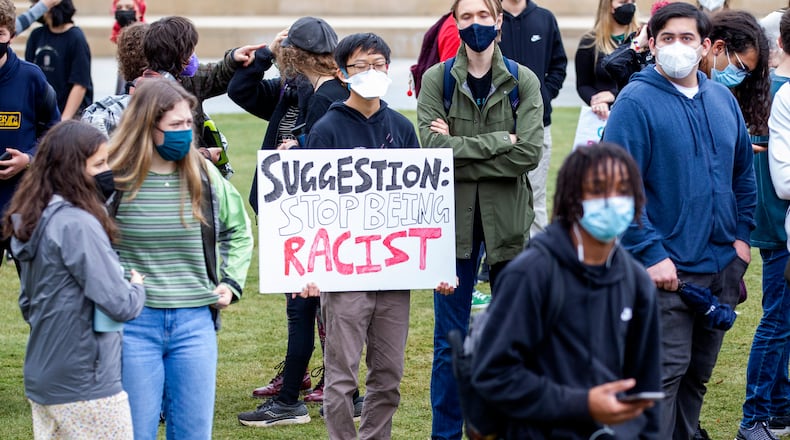At school board meetings last spring, community members — many of them older and galvanized by far-right political groups via social media — demanded an end to classroom instruction around race and racism, social and emotional learning, and diversity, equity and inclusion programs.
Their demands contradicted everything we know about what children need to thrive in school and life — emotional health, rational thinking and an understanding of how the past impacts the present. Every major corporation now requires employees to undergo diversity, equity and inclusion training. Listening to angry speakers describe this training as dangerous indoctrination, I wondered who would take their allegations seriously.
Now, we know — a Republican-led Legislature willing to not only pander, but to create a police state in our public schools where proposed new laws would censor teachers for appearing unpatriotic, addressing the racism in such crimes as the murder of Ahmaud Arbery, and causing a student guilt or anguish over the legacies of slavery.
The Georgia proponents of bills that would ban the teaching of divisive concepts and create parents’ bill of rights are white, as are most supporters. These same bills are cropping up in many states and emanate from a manufactured hysteria around critical race theory, a college-level academic concept that examines the effect of racism on society and laws. CRT has emerged as a catchall phrase adopted by white people to describe what they feel is an overemphasis on race and racism in schools. They believe any social justice agenda in schools is offensive because America is a just country and there are no systematic barriers.
At a debate on House Bill 1084, the ban on divisive concepts, state Rep. Matthew Wilson, D-Brookhaven, said, “This bill and the national version that it was modeled after are a clear response to the discomfort and fear expressed by many folks who share my skin tone. This bill is whiter than the paper it’s printed on.”
Learning the history of slavery and racism should be uncomfortable but it is necessary, said Wilson, a former sixth grade teacher who is now an attorney. “If our white public school students are learning about the continued impact of slavery and are coming home feeling uncomfortable, that’s a good thing,” said Wilson. “It means we are teaching a generation of young Georgians to be people of conscience, to have empathy, to understand that we are still working to this very day to build that more perfect union.”
Another politically driven piece of legislation is House Bill 1178, the parents’ bill of rights, which would encourage parents to second-guess everything a teacher says or does. The law would leave teachers undermined and under attack, especially the requirement that they detail classroom plans weeks in advance, said Rep. Erick Allen, D-Smyrna.
“This is the equivalency of asking you to post what you will be eating for breakfast, lunch and dinner for the next nine weeks. And be sure to list all the ingredients, where you purchased them and any recipes,” said Allen. “Anyone who has a problem with any of the meals you prepare must be given an alternative meal and you need to describe those meals, too. Would you still want to be a teacher in Georgia?”
The bill of rights legislation would enable parents of teens over the legal age of consent to still pull their teens out of sex education classes. Since Georgia allows 16- and 17-year-olds to make their own decisions about having sex, you might think it would be helpful to give them the opportunity to sit in a classroom and receive some sex education.
All these bills seeking to restore conservative values to Georgia classrooms would burden teachers and cast them as adversaries to be dragged in front of their local of board of education or even the state Board of Education for censure at the whim of a parent.
The bills represent a last-gasp backlash to the changing demographics and politics of the state, which is becoming majority-nonwhite for the first time. As The Atlanta Journal-Constitution has reported, the 29 counties in the Atlanta Metropolitan Statistical Area and their 6.1 million residents were nearly 51% white in 2010. Now they’re slightly less than 44% white.
The consolation to educators for this new hostile classroom environment is supposed to be their long-promised raise from Gov. Brian Kemp, which legislators keep referencing as proof they do support teachers. Despite their claim to respect educators, lawmakers are sacrificing them to a political charade to appease voters yearning for a 1950s schoolhouse where no one got to choose their pronoun, woke was a past participle and the values, views and biases of the white majority prevailed.
About the Author
The Latest
Featured



